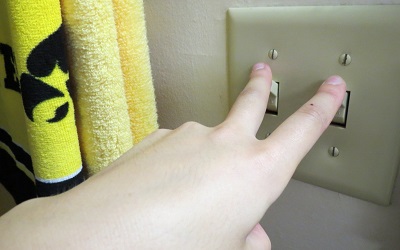College of Liberal Arts & Sciences
Residence Halls Compete in Energy Bowl

For two weeks in October, students in UI residence halls competed the third annual Energy Bowl, designed to show that a few small actions can add up to reduce energy consumption.
The Energy Bowl, held Oct. 17-30, pitted the residence halls against each other to see who could save the most energy and hold the most events to raise awareness of energy consumption,
Douglas Litwiller, associate director of energy conservation at the University of Iowa, measured energy reduction at each building by comparing the energy consumption of the building during the competition to a two-week baseline period before the competition.
Each residence hall earned points for energy reduction and events held in the hall pertaining to energy waste. Burge Hall was the winner with 122 points, followed by Daum Hall at 121 points, and Mayflower at 114 points. The prize was a catered pizza party for residents, courtesy of Herky CARES.
“A lot of it is making people aware of what they’re consuming,” said Claire Wilson, programming chair for Herky CARES and heading this year’s Energy Bowl. “We decided this year to promote for the long term, (past two weeks).”
Events in the halls included energy-focused movie nights and guest speaker Litwiller performing as Professor KW Therm, who showed residents easy ways to reduce energy waste.
Amanda Bittorf, marketing specialist for Housing and Dining, offered tips for residents to conserve energy, including:
- Only turning on lights you need
- Opening blinds during the day to warm up a room instead of turning up the heater.
- Unplugging electronics while not in use to avoid using up phantom energy.
Students have already begun applying some of these tips even after the competition has finished.
Junior Kaitlin Korleski said she tries to take quick showers.
According to the Environmental Protection Agency, EPA, an average shower lasts eight minutes with a standard showerhead using 2.2 gallons per minute. That’s 18 gallons of water per shower.
“I always make sure to turn off the lights when I leave for class,” said Marisa Riccell, a freshman in Burge. “Little things like that.”
It may sound like little things, but they add up Wilson said. She says it’s about making it an everyday occurrence.
Saving energy is “not a difficult thing to do,” Wilson said. “Just make it a habit; little everyday things can make a huge difference.”